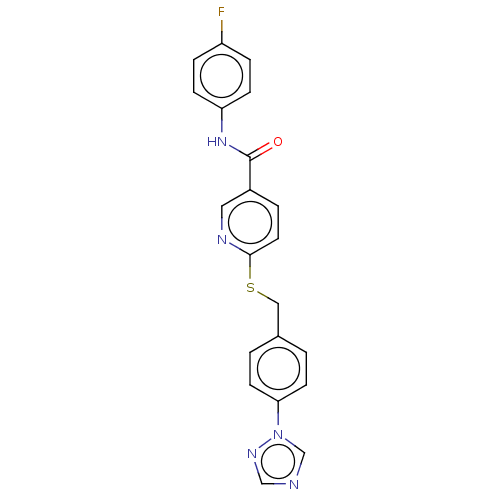

 Search and Browse
Search and Browse
 Download
Download
 Enter Data
Enter Data
null
SMILES: Fc1ccc(NC(=O)c2ccc(SCc3ccc(cc3)-n3cncn3)nc2)cc1
InChI Key: InChIKey=DIBKFYNBWFTSRL-UHFFFAOYSA-N
| Target/Host (Institution) | Ligand | Target/Host Links | Ligand Links | Trg + Lig Links | Ki nM | ΔG° kcal/mole | IC50 nM | Kd nM | EC50/IC50 nM | koff s-1 | kon M-1s-1 | pH | Temp °C |
|---|---|---|---|---|---|---|---|---|---|---|---|---|---|
| C-X-C chemokine receptor type 2 (Homo sapiens (Human)) | BDBM150844 (US8981106, 33) | PDB Reactome pathway KEGG UniProtKB/SwissProt antibodypedia GoogleScholar AffyNet | PC cid PC sid UniChem | Article PubMed | n/a | n/a | >1.00E+4 | n/a | n/a | n/a | n/a | n/a | n/a |
Syntrix Biosystems Curated by ChEMBL | Assay Description Antagonist activity at CXCR2 in human PMNs assessed as inhibition of CXCL1-induced intracellular Ca2+ release by fluorescence based calcium flux assa... | J Med Chem 57: 8378-97 (2014) Article DOI: 10.1021/jm500827t BindingDB Entry DOI: 10.7270/Q2FX7C22 | |||||||||||
| More data for this Ligand-Target Pair | |||||||||||||
| C-X-C chemokine receptor type 2 (Homo sapiens (Human)) | BDBM150844 (US8981106, 33) | PDB Reactome pathway KEGG UniProtKB/SwissProt antibodypedia GoogleScholar AffyNet | PC cid PC sid UniChem | US Patent | n/a | n/a | >1.00E+4 | n/a | n/a | n/a | n/a | n/a | 37 |
Syntrix Biosystems, Inc. US Patent | Assay Description An in vitro assay showed inhibition of CXCR2-mediated intracellular calcium release. Briefly, human neutrophils were suspended in HBSS- (without Ca2+... | US Patent US8981106 (2015) BindingDB Entry DOI: 10.7270/Q2WW7GC1 | |||||||||||
| More data for this Ligand-Target Pair | |||||||||||||